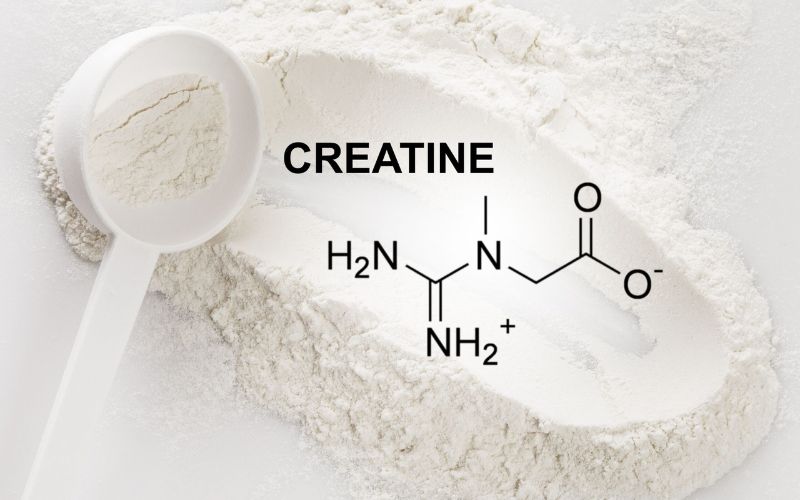When you hear the word creatine, your mind probably jumps to weightlifters and bodybuilders. But there’s growing evidence that creatine for runners and endurance athletes might be more beneficial than once believed.
While creatine is mostly known for increasing strength and muscle mass, endurance athletes including marathoners, triathletes, and trail runners are now turning to it for improved performance, faster recovery, and even brain function.
So, is creatine a smart choice for runners? Let’s take a deeper look at what the research says, how it works, and how to use it effectively.
Looking to boost stamina and speed? Discover how creatine can enhance performance for runners and endurance athletes—find out if it’s right for you!
Table of Contents
What Is Creatine and How Does It Work?
Creatine is a naturally occurring compound found in foods like red meat and fish. It’s also produced by the liver, kidneys, and pancreas. Its primary function is to help produce ATP (adenosine triphosphate), the main energy currency in our body.
During short, intense efforts—like sprinting, hill climbs, or finishing kicks—your body taps into stored creatine to rapidly regenerate ATP. Supplementing with creatine increases these stores, allowing you to:
- Push harder in intense bursts
- Recover faster between efforts
- Maintain muscle strength and power
This is why creatine for runners is gaining popularity, especially for those combining endurance with speed or strength training.
Benefits of Creatine for Runners and Endurance Athletes

While creatine has traditionally been associated with anaerobic training, new research shows it can be surprisingly effective for endurance athletes too.
1. Improved Sprint Performance
Many races, especially 5Ks, 10Ks, and triathlons, include moments of high-intensity effort—whether you’re overtaking another runner or sprinting to the finish line. Creatine improves these anaerobic bursts, giving you an extra edge.
2. Enhanced Recovery Between Intervals
Runners often do high-intensity interval training (HIIT) or track sessions. Creatine may reduce muscle fatigue and soreness, helping you bounce back faster between sets and workouts.
3. Muscle Preservation During Long Runs
While distance running builds endurance, it can lead to muscle breakdown over time. Creatine helps preserve lean muscle, keeping you strong and reducing the risk of injury, especially during marathon training.
4. Cognitive and Neuromuscular Benefits
Emerging research shows creatine supports brain function and mental clarity—especially under stress. For endurance athletes, this can help with focus and decision-making during long or complex races.
5. Improved Hydration and Thermoregulation
Creatine pulls water into muscle cells. While some fear “water weight,” this actually helps with cellular hydration, which is beneficial for endurance athletes training in hot or humid conditions.
Does Creatine Cause Weight Gain in Runners?
One of the biggest myths about creatine for runners is that it leads to bloating or unwanted weight gain. Here’s the truth:
- Initial weight gain (1–2 kg) is often due to increased water retention inside the muscle—not fat.
- This water actually supports hydration and performance.
- Many endurance athletes don’t even notice a change, especially when using Creatine HCL or micronized forms.
In short, the benefits often outweigh the small and temporary increase in body weight.
Best Types of Creatine for Endurance Athletes

Choose fast-absorbing and low-bloat creatine forms like monohydrate, HCL, or micronized to support endurance, recovery, and performance without unwanted water weight.
Creatine Monohydrate
The most studied and widely used form. It’s effective, affordable, and works well for most people. If you’re new to creatine, this is a great starting point.
Creatine HCL (Hydrochloride)
Dissolves more easily in water and may cause less bloating. Ideal for runners concerned about water retention or GI discomfort.
Micronized Creatine
Same as monohydrate, but processed into smaller particles for better solubility and absorption.
All three options can support endurance training—you just need to find the one that suits your body and routine.
How to Use Creatine as a Runner
Taking creatine for runners is simple and effective when done consistently. Here’s how:
- Daily dosage: 3–5g per day
- Timing: Anytime, but post-run or with a meal is common
- Loading phase: Optional (20g/day for 5 days), but not necessary for endurance athletes
- Hydration: Drink plenty of water daily to support muscle hydration
You don’t need to cycle off creatine. Just stay consistent for best results.
Is Creatine Safe for Runners?
Yes, creatine is one of the most researched and safest supplements on the market. It’s well-tolerated, even in long-term studies.
However, to ensure safety:
- Always follow recommended dosages
- Stay hydrated
- Choose high-quality, third-party tested products from trusted brands
Who Can Benefit Most?
You might benefit from creatine if you’re:
- A middle-distance or long-distance runner
- Training for a triathlon or marathon
- Doing strength training alongside running
- Focused on sprint intervals or hill work
- Looking to improve recovery and muscle preservation
FAQs About Creatine for Runners
Q1: Should distance runners use creatine?
Yes. While it’s more known for strength sports, distance runners can benefit from better recovery, muscle preservation, and performance during high-effort segments.
Q2: Will creatine slow me down by adding weight?
Initial water weight may increase slightly, but it won’t slow you down. In fact, creatine improves power output and speed.
Q3: Can I take creatine on rest days?
Yes. Consistency is key, so take your daily dose even on rest days.
Q4: Can vegetarians or vegans benefit more from creatine?
Definitely. Since creatine is mostly found in meat and fish, plant-based athletes often have lower natural stores—making supplementation even more effective.
Conclusion: Is Creatine a Smart Choice for Runners?
Absolutely. While not a traditional endurance supplement, creatine for runners offers clear benefits—from improved sprint capacity and recovery to muscle preservation and hydration.
If you’re serious about performance and recovery, creatine could be the secret weapon your training plan is missing.
Ready to elevate your endurance game?
Shop premium, athlete-approved creatine supplements at Nutritional World—Pakistan’s trusted source for authentic, high-quality sports nutrition products.


























